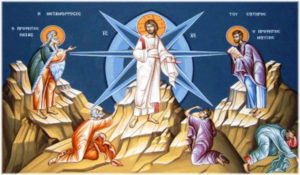Mount Calvary Church
Eutaw Street and Madison Avenue
Baltimore, Maryland
A Roman Catholic Parish of
The Personal Ordinariate of St. Peter
Anglican Use
Rev. Albert Scharbach, Pastor
Dr. Allen Buskirk, Choirmaster
Midori Ataka, Organist
Sunday, March 8, 2020
Lent II
8:00 AM Said Mass
10:00 AM Sung Mass
Brunch to follow in undercroft
_________________
Common
Missa de Angelis
_________________
Anthems
O nata lux, Thomas Tallis (1510-1585)
O nata lux de lumine, Jesu redemptor saeculi, Dignare clemens supplicum Laudes precesque sumere. Qui carne quondam contegi Dignatus es pro perditis, Nos membra confer effici Tui beati corporis.
O Light born of Light, Jesus, redeemer of the world, with loving-kindness deign to receive suppliant praise and prayer. Thou who once deigned to be clothed in flesh for the sake of the lost, grant us to be members of thy blessed body.
Hymns
Come, Thou fount of every blessing (NETTLETON) is by Robert Robinson (1735-1790). Robinson uses the double rhyming of the odd-numbered lines to great effect, and the hymn is rich in Biblical imagery: the reference is from 1 Samuel 7:1-12: “Then Samuel took a stone and set it up between Mizpah and Jeshanah, and named it Ebenezer; for he said, ‘Thus far the Lord has helped us.’” (Ebenezer means stone of help). After a dissolute adolescence, Robinson was converted by the preaching of George Whitefield and became a Baptist minister. NETTLETON first appeared in John Wyeth’s Repository of Sacred Music, Part Second (1813).
What wondrous love (WONDROUS LOVE) is, as its repetitions evidence, an American folk hymn, from the Second Great Awakening. This hymn articulates the question that Christians ask every day: what did I do to deserve such a wonderful love from God and from Christ? The hymn is an offering of thanks to the Son for laying aside his crown as King and humbling himself even unto death. Jesus took on the sin and shame of man and thereby became the Lamb who was slain to save us from our sins. Jesus is not only the Lamb, but he is I AM, Lord and God. Our response is endless praise, and forever we shall marvel and ask, “What wondrous Love?”
#55 Forty days and forty nights (HEINLEIN) was written by the Anglican clergyman George Hunt Smyttan (1822-1870). It was published in the March 1856 edition of The Penny Post and was revised five years later as Forty Days and Forty Nights in Hymns Fitted to the Order of Common Prayer (1861), by the Rev. Francis Pott (1832–1909). HEINLEIN or AUS DER TIEFE is attributed to Martin Herbst (1654-1681).
_________
FORTY
Forty often symbolizes a time of testing or judgment. In the Old Testament, when God destroyed the earth with water, He caused it to rain 40 days and 40 nights. After Moses killed the Egyptian, he fled to Midian, where he spent 40 years in the desert tending flocks. Moses was on Mount Sinai for 40 days and 40 nights. Moses interceded on Israel’s behalf for 40 days and 40 nights. The Law specified a maximum number of lashes a man could receive for a crime, setting the limit at 40. The Israelite spies took 40 days to spy out Canaan. The Israelites wandered for 40 years. Before Samson’s deliverance, Israel served the Philistines for 40 years. Goliath taunted Saul’s army for 40 days before David arrived to slay him. When Elijah fled from Jezebel, he traveled 40 days and 40 nights to Mt. Horeb. Jonah warned that in 40 days Nineveh would be destroyed.
Lent is a time of testing and of growth to spiritual maturity. According to the Talmud, at age 40 a person transitions from one level of wisdom to the next. After Moses led the Jewish people for 40 years in the wilderness, he told them: “God has not given you a heart to know, and eyes to see, and ears to hear, until this day.” It took the Jewish people of testing 40 years before they reached a full level of understanding. After 40 days of Lent, we should grow into the full measure of manhood: “Though he were a Son, yet learned he obedience by the things which he suffered; And being made perfect, he became the author of eternal salvation unto all them that obey him.”
